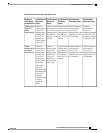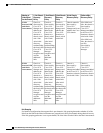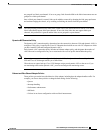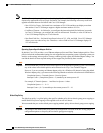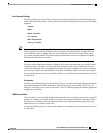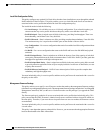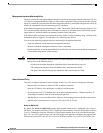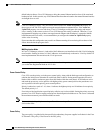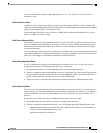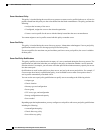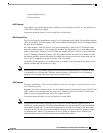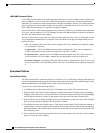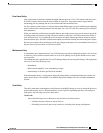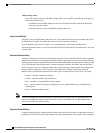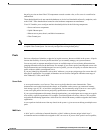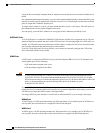
For more information about power supply redundancy, see Cisco UCS 5108 Server Chassis Hardware
Installation Guide.
Quality of Service Policy
A quality of service (QoS) policy assigns a system class to the outgoing traffic for a vNIC or vHBA. This
system class determines the quality of service for that traffic. For certain adapters you can also specify additional
controls on the outgoing traffic, such as burst and rate.
You must include a QoS policy in a vNIC policy or vHBA policy and then include that policy in a service
profile to configure the vNIC or vHBA.
Rack Server Discovery Policy
The rack server discovery policy determines how the system reacts when you add a new rack-mount server.
Cisco UCS Manager uses the settings in the rack server discovery policy to determine whether any data on
the hard disks are scrubbed and whether server discovery occurs immediately or needs to wait for explicit
user acknowledgement.
Cisco UCS Manager cannot discover any rack-mount server that has not been correctly cabled and connected
to the fabric interconnects. For information about how to integrate a supported Cisco UCS rack-mount server
with Cisco UCS Manager, see the hardware installation guide for that server.
Server Autoconfiguration Policy
Cisco UCS Manager uses this policy to determine how to configure a new server. If you create a server
autoconfiguration policy, the following occurs when a new server starts:
1
The qualification in the server autoconfiguration policy is executed against the server.
2
If the server meets the required qualifications, the server is associated with a service profile created from
the service profile template configured in the server autoconfiguration policy. The name of that service
profile is based on the name given to the server by Cisco UCS Manager.
3
The service profile is assigned to the organization configured in the server autoconfiguration policy.
Server Discovery Policy
This discovery policy determines how the system reacts when you add a new server. If you create a server
discovery policy, you can control whether the system conducts a deep discovery when a server is added to a
chassis, or whether a user must first acknowledge the new server. By default, the system conducts a full
discovery.
If you create a server discovery policy, the following occurs when a new server starts:
1
The qualification in the server discovery policy is executed against the server.
2
If the server meets the required qualifications, Cisco UCS Manager applies the following to the server:
• Depending upon the option selected for the action, either discovers the new server immediately or
waits for a user to acknowledge the new server
• Applies the scrub policy to the server
Cisco UCS Manager GUI Configuration Guide, Release 2.0
OL-25712-04 25
Server Architecture and Connectivity



